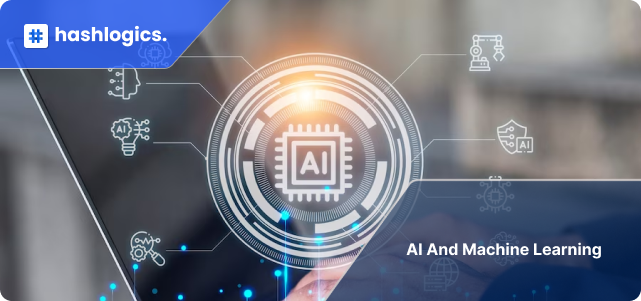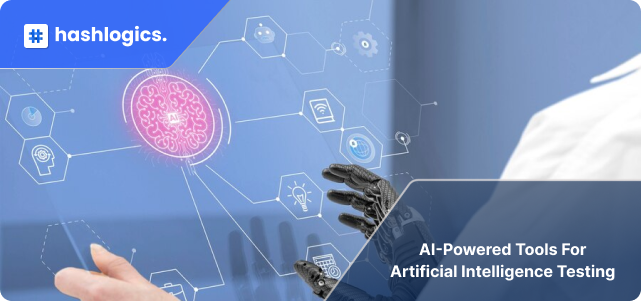Software testing is an important phase in application development. It is the process of assessing the functionality, performance, and quality of the software to ensure alignment with specific requirements. Traditional testing methods are often laborious, time-consuming, and prone to human error. This is where Artificial Intelligence (AI) comes in to improve and simplify the testing process.
In just a few months, AI has significantly transformed industries globally in both positive and negative ways. While there is still room for improvement in this groundbreaking technology, however, businesses need to embrace it; otherwise, they will be left behind. In the QA industry, AI testing is expected to become the norm in the coming years, bringing remarkable advancements in the way we approach and conduct software testing.In this article, we will thoroughly explore the concept of AI testing and examine how AI can optimize testing processes. Additionally, we will also discuss the leading AI testing tools that play a crucial role in reshaping your QA workflows, while highlighting the benefits of using Artificial intelligence in software testing.
What is AI?
AI refers to a machine’s ability to perform tasks that are typically done by human intelligence, such as learning, reasoning, problem-solving, and decision-making. It works using rule-based systems, expert systems, neural networks, and machine learning. It uses techniques and algorithms to learn from data, make decisions based on patterns and rules, and improve performance progressively.

AI and Machine Learning
The concepts of Artificial Intelligence (AI) and Machine Learning (ML) are usually used interchangeably, but they are not the same. AI refers to a machine’s ability to perform common human activities like learning, thinking, and problem-solving. Whereas Machine Learning is a subset of artificial intelligence that uses algorithms to analyze data, learn from it, and make predictions or decisions based on that data.
Artificial intelligence and machine learning can be used in software testing to automate various steps in the testing procedure. AI-driven testing solutions, for example, can analyze the application being tested and generate test cases for important areas of the application. Software testers can save time and effort and ensure that essential portions of the program are thoroughly tested.
Machine Learning can be used for testing data analysis and identifying trends. It allows testers to concentrate on the most crucial part of the application while reducing the number of test cases. Moreover, Machine learning can automatically detect faults and errors.
What is AI Testing?
AI testing is the process of assessing a system’s functionality, performance, and reliability using artificial intelligence (AI). Although it incorporates the basic techniques of traditional software testing, AI technology has significantly improved these techniques.
AI testing can also be defined as testing for AI-based systems or testing for AI. These systems use different AI technologies, like machine learning, natural language processing (NLP), computer vision, deep learning, and expert systems to process large amounts of data to identify patterns and make informed decisions.
The Benefits of Using AI for Software Testing
AI is inevitable, and instead of worrying about it taking our jobs, we should just embrace it as a tool to make our work easier. Here are some advantages of software testing using artificial intelligence:
Increased Speed and Efficiency:
One of the main benefits of using AI in software testing is the increased speed and efficiency. AI-driven tools excel at executing repetitive and time-consuming tasks such as regression testing, functional testing, and performance testing, much quicker than human beings. It not only saves time but also reduces the risk of human errors.
You can use AI tools, like ChatGPT to generate test cases within seconds by providing acceptance criteria. It can also help with your software test automation by writing BDD-style test scenarios, which you can add to a test automation framework or you can even ask it to write test scripts or help debug your test code.
Cost Effective:
Using AI software testing can result in cost savings. When companies automate repetitive tasks, they don’t rely on human testers, which reduces labor costs. Furthermore, AI-powered tools assist in detecting defects and bugs earlier in the software development lifecycle, thereby minimizing the cost of fixing issues later on and improving the overall efficiency of product launches.
Quick Generation of Test Data for Data-Driven Testing:
Sometimes for a thorough test, you might need a large volume of data or a vast number of data combination inputs.
For instance, testing the search functionality on an e-commerce website with thousands of different search queries for various products and locations. Instead of creating these data points from scratch or spending a long time finding a suitable dataset online, you can simply instruct the AI to generate a database for you. The high level of customization allows you to prepare mock test data for almost any scenario you need.
Improved Quality Assurance:
AI-powered tools can increase the quality of software testing by finding defects and bugs that might go unnoticed. These tools can analyze large amounts of data and offer insights that improve the overall quality of the application under test. Moreover, AI QA can help in recognizing patterns and trends in testing data that improve the testing process and prevent defects in the future. QA artificial intelligence automates processes, enhances accuracy, and optimizes resource utilization. QA experts should use advanced AI QA testing tools to ensure top-notch quality.
Using ChatGPT for Software Testing
ChatGPT is making a significant impact in the AI world and offering great advantages to software testers. To use ChatGPT effectively, it is important to master prompt engineering and, at a broader level, problem decomposition. When we face certain testing challenges, one can explore how ChatGPT can help and then create a systematic solution that can be converted into a prompt. While ChatGPT does not conduct testing autonomously, it can be instructed to handle repetitive tasks that allow QA teams to focus on strategic planning aspects.
AI-Powered Tools for Artificial Intelligence Testing
Here are some software testing tools that are leading the way in the AI testing trend and integrating AI technologies into their systems to bring software testing to new heights.
- Test Craft:
TestCraft is an AI-powered test automation platform that revolutionizes regression and continuous testing by using the power of Selenium and provides thorough monitoring for web applications. The incorporation of AI technology enables quick adaptation to changes in the application, reducing both maintenance time and costs.
- Applitools:
Applitools is a software that handles visual applications and uses visual AI for AI-powered visual user interface (UI) testing and monitoring. The integrated AI and machine learning algorithms are completely adaptive, allowing it to scan and analyze app screens just like the human eye and brain, but with the power of a machine.
- Testim:
Testim is an automated functional testing tool that uses artificial intelligence and machine learning to speed up the authoring, execution, and maintenance of automated tests. In terms of compatibility, the tool runs on various browsers and platforms, including Chrome, Firefox, Safari, Edge, and Android.
- Katalon Platform:
The Katalon Platform is a quality management platform that facilitates test creation, management, execution, maintenance, and reporting for web, API, desktop, and mobile applications with minimal engineering and programming skills. It is an AI-powered testing platform with many AI features.
- Mabi:
Mabi is a recent testing tool that uses AI and machine learning to assist esters with their efforts. It runs the default test that is common to many applications and navigates through the screens of the given app. This tool also uses machine-learning algorithms to improve test execution and identify defects.

Conclusion:
The era of Artificial Intelligence is already here; it is not for the future, especially in our professional lives. This is advantageous as it simplifies our work.
Whether we rely on bots like ChatGPT for answering our questions, generating test scenarios, and providing test data or using AI-powered tools to enhance test automation coverage and reliability, artificial intelligence is a valuable tool to minimize manual efforts and improve productivity.
In today’s digital era, every software development team should embrace AI to stay competitive.


